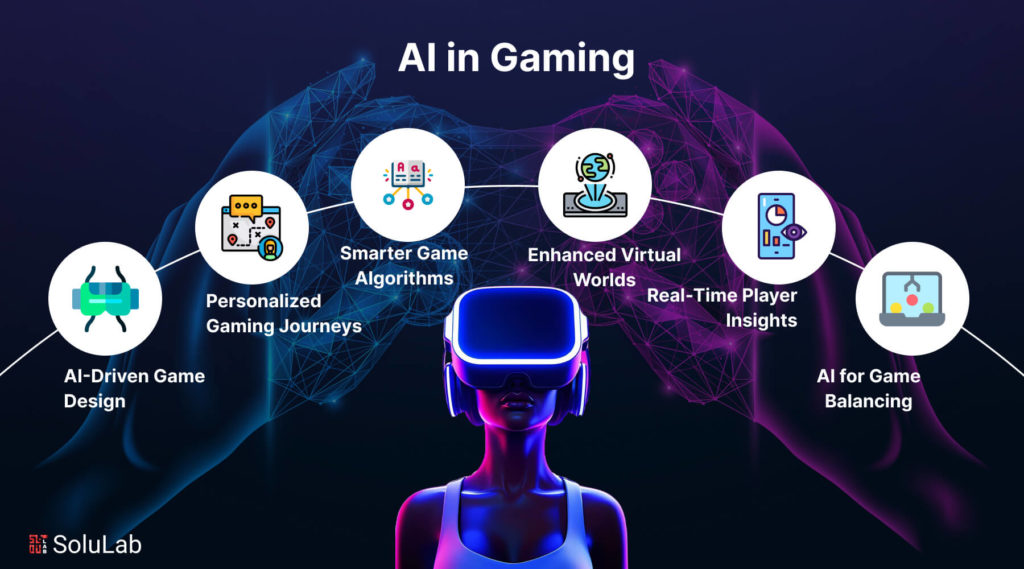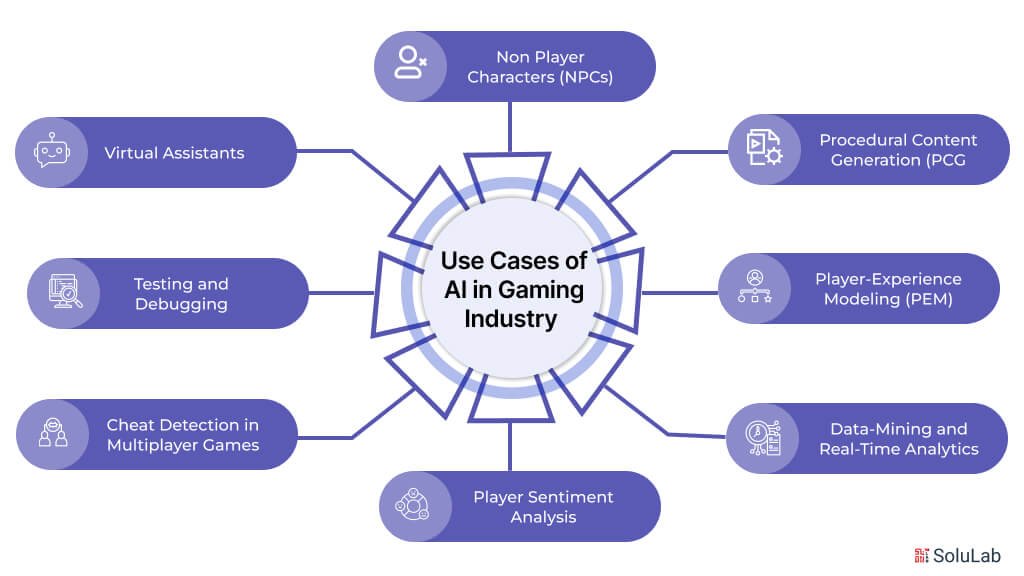
The Evolution of AI in Gaming
Introduction to AI in Gaming
AI has transformed the gaming landscape, bringing depth, complexity, and realism to the interactive experience. From the early days of arcade games to today’s expansive virtual worlds, AI’s role has expanded significantly. Imagine playing a game with NPCs that act as if they possess their own personalities, adapting their behavior based on your decisions – this was once the stuff of dreams, but now it’s a reality.
Historical Overview of AI Implementation in Games
The journey of AI in gaming is fascinating and can be categorized into several key milestones:
- 1970s-1980s: Simple algorithms dictated enemy movements, as seen in games like Pong and Pac-Man. These early forms of AI provided basic challenges for players.
- 1990s: The introduction of pathfinding algorithms made AI opponents more sophisticated, as featured in Doom and Command & Conquer.
- 2000s-Present: Advancements in machine learning and neural networks have allowed for the development of immersive worlds. Games like The Last of Us and Red Dead Redemption 2 showcase how dynamic NPC interactions and adaptive storytelling elevate gameplay experiences.
This evolution demonstrates how AI is innovating gameplay experiences, ensuring that each player encounter feels unique and engaging.

AI-driven Gameplay Mechanics
Procedural Content Generation
One of the most exciting advancements in AI-driven gameplay mechanics is procedural content generation (PCG). This technique allows developers to create vast, varied worlds without intensive manual labor. Imagine diving into a game like No Man’s Sky, where every planet you explore is uniquely generated. This method not only enhances replayability but also makes each player’s journey feel distinctly their own.
- Benefits of Procedural Content Generation:
- Expands the universe without exhausting resources.
- Keeps gameplay fresh and engaging.
- Provides endless exploration opportunities for players.
Dynamic Difficulty Adjustment
Another thrilling application of AI is dynamic difficulty adjustment (DDA). Games can now analyze a player’s performance in real-time and modify challenges accordingly. Remember that moment while battling a boss in Dark Souls that felt impossibly tough? With DDA, the game could have subtly altered enemy health or attack patterns based on your skills, giving you a fair chance while still maintaining the thrill of the challenge.
- Advantages of Dynamic Difficulty Adjustment:
- Ensures that players remain engaged without feeling frustrated.
- Tailors challenges to individual player skill levels.
- Enhances overall player satisfaction and retention.
These AI-driven mechanics are a testament to how technology is genuinely innovating gameplay experiences.

AI for Realistic NPCs
Enhancing Non-Player Character Behavior
As gaming has evolved, so too has the behavior of non-player characters (NPCs). Through advanced AI, NPCs can now exhibit lifelike behaviors and reactions, significantly enriching the gameplay experience. Picture wandering through a bustling marketplace in The Elder Scrolls V: Skyrim, where NPCs engage in conversations, react to weather changes, and even exhibit emotions based on player actions. This level of interaction invites players into a vibrant world that feels alive.
- Features of Enhanced NPC Behavior:
- Realistic decision-making based on the player’s choices.
- Natural dialogue systems that adapt to player interactions.
- Emotional responses that contribute to a more immersive atmosphere.
Creating Immersive Gaming Worlds through AI
Beyond individual behavior, AI also plays a pivotal role in crafting entire gaming worlds that feel interconnected and responsive. In GTA V, the dynamic environment includes pedestrians who react to crime scenes and traffic patterns, creating a living backdrop for players. This immersive experience captivates players, making them feel like key characters in an unfolding narrative.
- Key Elements of Immersive Game Worlds:
- Responsive environments that adapt to player actions.
- Dynamic storytelling influenced by NPC behavior.
- Layered narratives that provide depth and engagement.
Through these advancements, AI is significantly changing how we perceive and engage with gaming universes, setting new standards for realism and immersion.

Personalized Player Experiences
Adaptive Game Environments
As gaming technology continues to advance, creating personalized player experiences has become a focal point, and adaptive game environments are leading the charge. Imagine stepping into a fantasy world that evolves based on your interactions—whether it’s the flora changing under your choices or cities reacting to your reputation. In games like Shadow of the Tomb Raider, every decision you make enhances the narrative, making the world feel uniquely yours.
- Benefits of Adaptive Game Environments:
- Increased immersion as the environment shifts in response to player actions.
- Reinforced storytelling that strengthens emotional engagement.
- Greater replayability as each playthrough offers new experiences.
Tailored Challenges and Rewards with AI
Tailoring challenges and rewards with AI takes personalization to the next level. By assessing player skill levels and preferences, games can present challenges that are neither too easy nor overwhelmingly difficult. For instance, titles like Assassin’s Creed Valhalla adjust mission difficulties based on how adeptly players complete prior tasks.
- Advantages of Tailored Challenges:
- Keeps players motivated and engaged with bespoke experiences.
- Ensures that challenges evolve with player skill, preventing stagnation.
- Offers meaningful rewards that resonate with individual player choices.
These personalized experiences not only enhance enjoyment but also create an emotional connection with the game, illustrating just how effectively AI is innovating gameplay experiences.

AI in Player Engagement and Retention
Predictive Analytics for Player Behavior
The implementation of AI extends to understanding and predicting player behavior, a facet integral to enhancing player engagement and retention. Predictive analytics allows developers to analyze vast amounts of player data, identifying patterns that indicate how long someone might play, what game features they enjoy, or even when they may disengage. For example, game studios like Ubisoft utilize this technology to tailor notifications or content releases that resonate with individual players, keeping them invested over time.
- Benefits of Predictive Analytics:
- Anticipates player needs and preferences.
- Drives targeted marketing strategies to keep players informed.
- Reduces churn rates by identifying at-risk players and re-engaging them effectively.
Social AI for Enhanced Multiplayer Experiences
In the multiplayer realm, Social AI plays a pivotal role in fostering community and cooperation among players. Games like Fortnite leverage AI to enhance matchmaking, ensuring players are grouped with others of similar skills and behaviors. This dynamic not only improves the gameplay experience but also encourages friendships and collaborative strategies.
- Advantages of Social AI in Multiplayer:
- Creates balanced matches that enhance competitive play.
- Encourages community building through smart matchmaking.
- Enables personalized interactions, making players feel seen and valued.
Together, these AI-driven strategies are revolutionizing how players engage with games, ensuring they remain connected and invested in their gaming journeys.

Ethical Considerations in AI Gaming Innovations
Fairness and Bias in AI Gameplay
As gaming continues to embrace AI, ethical considerations such as fairness and bias have become increasingly important. AI algorithms can inadvertently reflect the biases present in their training data, leading to unfair gameplay experiences. For instance, if an AI system is less effective at balancing teams in a multiplayer game, it could favor skilled players at the expense of newcomers.
- Challenges with Fairness in AI:
- Unequal matchmaking can frustrate players and lead to disengagement.
- Bias in AI storytelling can marginalize certain player demographics.
- Transparency in AI decision-making processes is crucial for trust.
Ensuring Player Privacy and Data Security
Another significant concern is the protection of player privacy and data security. With the vast amounts of personal data collected for predictive analytics and engagement strategies, developers must prioritize safeguarding that information. For instance, when players engage with The Elder Scrolls Online, they should feel assured that their gameplay data remains secure and private.
- Best Practices for Data Protection:
- Implementing robust encryption and security protocols.
- Clear communication regarding data collection practices.
- Regular audits and updates to ensure compliance with privacy regulations.
Addressing these ethical considerations is crucial in ensuring that AI innovations enhance the gaming experience while respecting players’ rights and fostering a fair environment.

